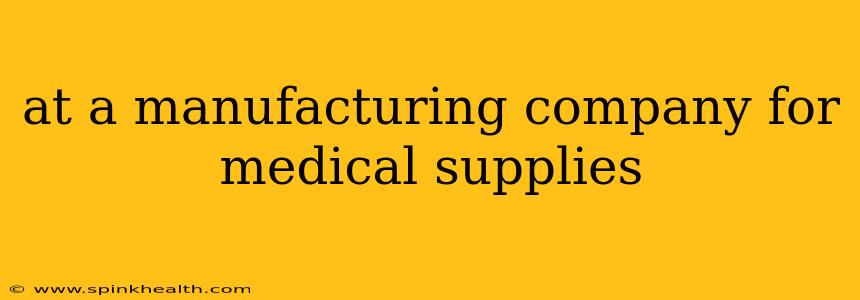A Day in the Life: Working at a Medical Supply Manufacturing Company
The hum of machinery, the precise movements of robotic arms, the quiet intensity of focused workers – this is the soundtrack of a medical supply manufacturing company. It’s a world where precision and accuracy aren't just buzzwords; they're the bedrock of life-saving work. My journey into this fascinating industry began unexpectedly, but the experiences I’ve had have been nothing short of transformative. Let me take you along for a day, showing you what it's truly like to work in this critical sector.
My day usually starts before the sun fully rises. The early shift is crucial; we need to ensure a steady flow of supplies throughout the day. I’m part of the quality control team, and my role is to ensure every single product meets the stringent standards required for medical use. This isn't just about checking for defects; it's about verifying the integrity of products that will directly impact patient health.
We start with a thorough briefing, reviewing the production schedule and any potential issues from the previous shift. Then, it’s into the thick of it – inspecting finished goods, running tests, and meticulously documenting everything. Every single needle, every bandage, every vial of medication – all undergo rigorous scrutiny.
What are the different roles in a medical supply manufacturing company?
The beauty of this industry is its diversity. It's not just about manufacturing; it's a complex ecosystem of roles. You have the engineers who design and maintain the sophisticated machinery; the technicians who operate and troubleshoot the equipment; the quality control specialists (like me!), ensuring the highest standards are met; the logistics teams responsible for the seamless distribution of supplies; and the research and development teams constantly innovating and improving existing products. Beyond this, there are also administrative and management roles supporting the entire operation.
What kind of training is required to work in medical supply manufacturing?
The training varies greatly depending on the specific role. For quality control, I needed a strong scientific background coupled with rigorous training on specific testing methodologies and regulatory compliance. Many roles require certifications or specific qualifications. Engineers need strong engineering degrees, technicians often require vocational training, and those in logistics need a thorough understanding of supply chain management. The common thread is a commitment to precision and attention to detail.
What are the safety regulations in a medical supply manufacturing facility?
Safety is paramount. We operate under incredibly strict guidelines, adhering to both industry-specific standards and government regulations. Think stringent hygiene protocols, mandatory personal protective equipment (PPE), regular safety training, and emergency procedures practiced frequently. Every employee understands that even the smallest lapse could have significant consequences. It's a culture ingrained in every aspect of the facility’s operations.
What are the career progression opportunities in medical supply manufacturing?
The possibilities are vast. You could specialize in a particular area, becoming a senior technician, a lead quality control specialist, or even a production manager. With experience and further training, you could transition into roles in research and development, design engineering, or even move into management. The growth potential is significant, especially given the ever-growing demand for medical supplies globally.
What are the working conditions like in a medical supply manufacturing facility?
The work environment is often clean, well-lit, and climate-controlled – a stark contrast to some manufacturing settings. While the work is demanding, requiring precision and focus, the atmosphere is generally positive and collaborative. Teamwork is crucial, and everyone understands the critical nature of their contribution. It’s demanding, but it’s also incredibly rewarding.
As the day winds down, and the final inspections are completed, a sense of accomplishment fills the air. Knowing that the products we've carefully checked will contribute to patient care, makes the demanding nature of this work worthwhile. It's not just a job; it’s a calling, a commitment to quality, and a vital contribution to global healthcare. It's a privilege to be a part of this essential industry.

